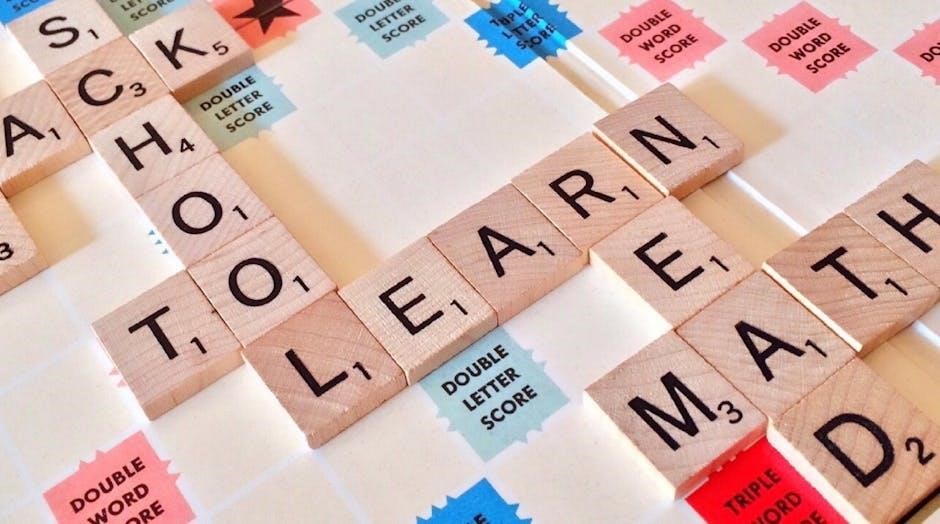Malcolm X’s journey from prison to empowerment through self-education highlights the transformative power of literacy, reshaping his worldview and inspiring others to seek knowledge and liberation.
Overview of Malcolm X’s Life and Legacy
Born Malcolm Little, he endured a childhood marked by racism and hardship, leading to his involvement in criminal activity. While incarcerated, he discovered the Nation of Islam and embraced its teachings. After his release, Malcolm X became a prominent civil rights leader, advocating for African American rights and empowerment. His life was cut short by assassination in 1965, but his legacy endures as a symbol of resilience and transformation, inspiring countless individuals through his autobiography and unwavering commitment to justice.
The Significance of Literacy in Malcolm X’s Transformation
Literacy became the cornerstone of Malcolm X’s personal and intellectual revolution. Through self-education in prison, he transcended systemic oppression, discovering the power of language and ideas. Reading opened his eyes to historical truths and societal injustices, fueling his activism and leadership. His journey from illiteracy to profound understanding exemplifies how education can liberate and transform lives.
Malcolm X’s transformation underscores the enduring impact of literacy on personal growth and societal change, inspiring others to seek knowledge as a tool for empowerment and liberation.

Malcolm X’s Early Life and Education
Born Malcolm Little, his early education was marked by limited opportunities due to systemic racism and financial struggles, shaping his initial views on learning and inequality.

Childhood and Early Experiences with Learning
Malcolm X’s childhood was marked by limited educational opportunities due to systemic racism and financial struggles. His early experiences with learning were shaped by the harsh realities of poverty and discrimination. Despite these challenges, Malcolm exhibited a natural curiosity and desire to learn, which would later become a defining characteristic of his journey toward self-education and empowerment. His early interactions with education laid the foundation for his eventual transformation through literacy.
The Role of Education in His Early Years
Education played a limited yet formative role in Malcolm X’s early life. His experiences in school were influenced by racial biases, which hindered his academic growth. Despite this, Malcolm showed a keen interest in learning, often excelling in subjects like English. However, the lack of support and resources during his youth meant that his formal education was cut short, setting the stage for his later self-education journey. These early challenges underscored the systemic barriers he faced and motivated his future pursuit of knowledge.

Malcolm X’s Journey to Self-Education in Prison
In prison, Malcolm X transformed confinement into an opportunity for self-education. Despite initial struggles, he dedicated himself to learning, using a dictionary to expand his knowledge and empower his voice.
The Circumstances That Led Him to Prison
Malcolm X’s path to incarceration began with his involvement in criminal activities during his early adult years. Engaged in burglary and other unlawful acts, he was eventually arrested and sentenced to prison. This period marked a turning point in his life, as it was during his imprisonment that he discovered the power of literacy and embarked on a journey of self-education. His experiences in prison laid the foundation for his transformation from a life of crime to one of advocacy and leadership.
How He Began Teaching Himself to Read
Malcolm X initiated his self-education in prison by dedicating himself to studying a dictionary. He meticulously copied entire pages, memorizing words and their meanings. This rigorous process, though challenging, sparked his passion for learning. Over time, he transitioned from the dictionary to more complex texts, expanding his understanding of the world. His determination to educate himself laid the groundwork for his intellectual growth and eventual leadership role in advocating for racial equality and social justice.
The Process of Learning Through a Dictionary
Malcolm X’s self-education began with a dictionary, which became his foundational tool. He started by copying entire pages, meticulously writing down each word and its definition. This methodical approach helped him build a strong vocabulary. Over time, he learned to contextualize the words, gradually understanding their usage. The dictionary not only taught him to read but also broadened his comprehension, fostering a deep appreciation for language and knowledge. This process was instrumental in his transformation from an uneducated prisoner to a articulate leader.
Expanding His Knowledge Through Books
After mastering the dictionary, Malcolm X immersed himself in books, devouring texts on history, philosophy, and science. He read works by W.E.B. Du Bois and Carter G. Woodson, gaining insights into Black history and identity. This newfound knowledge reshaped his understanding of race and inequality, fueling his desire to challenge systemic oppression. Through reading, Malcolm discovered the power of ideas, which became the foundation of his later activism and leadership. Books transformed him from a prisoner into a scholar, equipping him with the tools to articulate his vision for justice and equality.
The Impact of Reading on His Worldview
Reading profoundly transformed Malcolm X’s perspective, shifting from narrow, radical ideologies to a broader understanding of global struggles. He realized the interconnectedness of racial oppression worldwide, fostering empathy for marginalized communities. This shift was pivotal in his evolution from a Nation of Islam spokesman to a human rights advocate. His newfound awareness emphasized education’s role in liberation, inspiring him to empower others through knowledge. Reading opened his eyes to the universality of human suffering and the importance of unity in the fight for justice.

The Autobiography of Malcolm X and the “Learning to Read” Excerpt
Co-authored with Alex Haley, the autobiography includes the pivotal “Learning to Read” chapter, detailing Malcolm X’s journey from illiteracy to self-empowerment through education, now available as a PDF.

How the Autobiography Came to Be
The autobiography was born from a collaboration between Malcolm X and journalist Alex Haley, who initiated the project after interviewing Malcolm for Playboy. Haley proposed transforming the interview into a book, leading to a formal agreement. Over several years, Malcolm shared his life story with Haley, who structured the narrative. The book was completed in 1965, the year of Malcolm’s assassination, and published posthumously, becoming a seminal work in American literature and a testament to Malcolm’s journey.
Alex Haley’s Role in Shaping the Narrative
Alex Haley played a pivotal role in transforming Malcolm X’s experiences into a compelling narrative. As the co-author and interviewer, Haley conducted extensive interviews, capturing Malcolm’s voice and reflections. He structured the autobiography chronologically, ensuring a coherent and engaging flow. Haley’s journalistic expertise complemented Malcolm’s raw, powerful storytelling, creating a balanced yet authentic portrayal of Malcolm’s life. His contributions were instrumental in preserving Malcolm’s legacy, making his story accessible to a broad audience and ensuring its enduring impact.
The Significance of the “Learning to Read” Chapter
The “Learning to Read” chapter is a pivotal excerpt from Malcolm X’s autobiography, detailing his transformative journey of self-education in prison. It highlights how he taught himself to read using a dictionary, gradually expanding his knowledge through books. This chapter underscores the power of literacy as a tool for empowerment and personal liberation. Malcolm’s journey from illiteracy to profound understanding not only shaped his worldview but also inspired countless others to pursue education as a means of self-improvement and societal change.
Unpublished Sections and Their Importance
The unpublished sections of Malcolm X’s autobiography, including those related to his “Learning to Read” journey, offer deeper insights into his intellectual and emotional growth. These sections, previously unseen, provide a more comprehensive understanding of his self-education process and its impact on his activism. Scholars and readers alike gain a richer perspective on Malcolm’s transformation, highlighting the significance of these hidden narratives in his legacy. These unpublished materials are invaluable for understanding the depth of his commitment to literacy and its role in shaping his worldview.

The Impact of Literacy on Malcolm X’s Activism
Literacy empowered Malcolm X to articulate his views on race and inequality, transforming him into a powerful orator and leader who inspired others to seek education and justice.
How Reading Shaped His Views on Race and Inequality
Malcolm X’s reading in prison exposed him to global histories and systemic injustices, reshaping his understanding of race and inequality. Through books on sociology and history, he discovered the roots of oppression, which deepened his critique of racism. His newfound knowledge empowered him to articulate a clearer vision for justice, transforming him from a disempowered individual into a vocal advocate for civil rights and self-determination.
Using Knowledge to Empower Himself and Others
Malcolm X leveraged his acquired knowledge to empower both himself and his community. Through his newfound literacy, he gained confidence and clarity, enabling him to challenge systemic oppression. He shared his insights through speeches and writings, inspiring others to seek education and self-awareness. By transforming his own life, he became a powerful symbol of self-empowerment, proving that education could be a tool for liberation and social change, both individually and collectively.
Malcolm X as a Leader and Orator
Malcolm X’s mastery of literacy transformed him into a compelling leader and orator. His ability to articulate the struggles of oppression and advocate for justice resonated deeply with his audience. Through his speeches and writings, he empowered marginalized communities, challenging systemic inequality. His newfound knowledge sharpened his communication skills, making him a powerful voice for change. Malcolm’s journey from self-education to leadership exemplifies how literacy can amplify one’s impact and inspire collective action for social justice.
Cultural and Historical Significance of Malcolm X’s Literacy
Malcolm X’s literacy journey symbolizes the power of education to overcome oppression, inspiring generations to seek knowledge and challenge systemic inequality, leaving a lasting cultural legacy.
How His Story Inspires Others to Seek Education
Malcolm X’s transformative journey from illiteracy to profound knowledge inspires countless individuals to pursue education. His determination to learn, even in prison, demonstrates the power of self-education and resilience. Through his autobiography, readers witness his evolution, gaining insight into how literacy empowered him to challenge systemic oppression. His story motivates people from all walks of life to seek knowledge, emphasizing education’s role in personal and societal transformation. Malcolm X’s legacy continues to encourage individuals to embrace learning as a tool for liberation and self-improvement, making his impact timeless and universal.
The Relevance of His Journey in Modern Times
Malcolm X’s journey to literacy remains profoundly relevant today, inspiring individuals to embrace education as a tool for empowerment. His story highlights the ongoing struggle against systemic inequality and the importance of self-directed learning. In an era where access to information is vast, his commitment to knowledge serves as a reminder of education’s liberating power. The digital availability of “Learning to Read” ensures his message reaches new generations, continuing to inspire personal growth and societal change, proving his legacy endures in modern times.

Personal Reflections on Education from Malcolm X
Malcolm X emphasized education as a tool for self-empowerment, advocating for critical thinking and the pursuit of knowledge to challenge systemic oppression and foster personal liberation and societal change.
Quotes and Insights from His Writings
Malcolm X’s writings reveal profound reflections on education. In his autobiography, he states, “The dictionary became my first contact with the black race.” This highlights his journey of self-discovery through literacy. He emphasizes, “Reading opened my eyes to the atrocities of racism and ignited my desire for justice.” His words underscore the transformative power of education, advocating for critical thinking and empowerment. Malcolm’s insights inspire individuals to seek knowledge as a tool for liberation, echoing his belief that “education is the passport to the future.”
Lessons Learned from His Educational Journey
Malcolm X’s educational journey teaches us the value of perseverance and self-directed learning. His commitment to literacy while incarcerated demonstrates that education can transcend adversity. He learned to read through dedication and curiosity, proving that knowledge is a powerful tool for empowerment. His story highlights the importance of seeking understanding and challenging societal norms, emphasizing that education is a lifelong journey. Malcolm’s experience inspires us to embrace learning as a means to transform ourselves and our communities.

Legacy of Malcolm X’s Commitment to Learning
Malcolm X’s dedication to literacy and self-education continues to inspire, emphasizing the power of knowledge to transform lives and challenge systemic inequality.
How His Legacy Continues to Influence Education
Malcolm X’s transformative journey underscores the profound impact of education on personal and societal change. His story inspires individuals to pursue knowledge despite adversity, emphasizing literacy as a tool for empowerment. Educators often incorporate his autobiography into curricula, highlighting self-directed learning and critical thinking. Malcolm X’s legacy motivates people to challenge systemic inequalities through education, proving that knowledge is a powerful catalyst for transformation and liberation.
The Enduring Message of Self-Empowerment
Malcolm X’s journey from illiteracy to profound understanding in prison showcases his enduring message of self-empowerment. By dedicating himself to learning, he transformed his life and became a powerful advocate for education. His story continues to inspire individuals, proving that knowledge is a tool for liberation and change. Malcolm X’s legacy emphasizes that self-directed learning can overcome even the most daunting barriers, fostering personal growth and societal impact. His message remains timeless, urging everyone to seek empowerment through education.
Malcolm X’s journey from imprisonment to empowerment through literacy serves as a timeless inspiration, proving that education can liberate and transform lives universally.
Malcolm X’s transformative journey through self-education in prison, detailed in his autobiography, underscores the profound impact of literacy on his life and activism. Using a dictionary, he learned to read, expanding his knowledge and reshaping his worldview. The pivotal chapter “Learning to Read” highlights this journey, showcasing how education empowered him. Available as a free PDF, this excerpt from his autobiography continues to inspire, offering insights into his path from imprisonment to becoming a influential leader and advocate for social justice.
Final Thoughts on the Importance of Literacy
Literacy was the catalyst for Malcolm X’s transformation, empowering him to challenge systemic oppression and advocate for justice. His journey underscores the enduring power of education to liberate minds and inspire change. In an era where access to knowledge remains a critical issue, Malcolm X’s story reminds us of the profound impact of literacy in fostering personal and societal progress. His legacy continues to inspire individuals to seek education as a tool for empowerment and self-determination.

Where to Access “Learning to Read” by Malcolm X
“Learning to Read” by Malcolm X is available as a free PDF download, along with his autobiography, on platforms like Scribd and various educational websites online.
Availability as a PDF and Other Formats
“Learning to Read” by Malcolm X is widely available as a free PDF download on platforms like Scribd and various educational websites. Additionally, it can be accessed as a text file (.txt) or read online. The excerpt is part of The Autobiography of Malcolm X, co-authored with Alex Haley, and is often shared for its inspirational and educational value. Many institutions and online archives offer this resource, making it easily accessible to readers worldwide who seek to understand Malcolm X’s transformative journey through literacy.
Recommended Reading and Resources
For a deeper understanding of Malcolm X’s literacy journey, “The Autobiography of Malcolm X” by Malcolm X and Alex Haley is essential reading. The chapter “Learning to Read” is particularly significant, showcasing his self-education process. PDF versions of this excerpt are available on platforms like Scribd and educational websites. Additional resources include scholarly articles and guides that explore the impact of literacy on his activism. These materials provide a comprehensive understanding of how education transformed Malcolm X’s life and message, inspiring others to embrace learning as a tool for empowerment.
